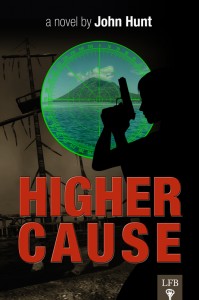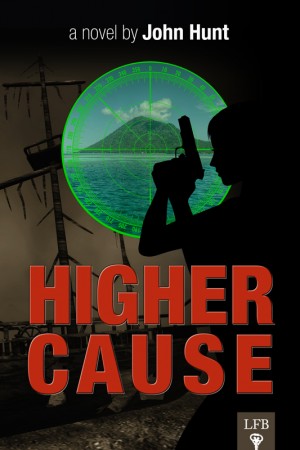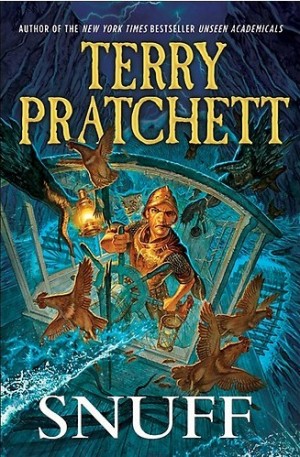
This review is part of a series covering each installment of the serialized novel Higher Cause, written by John Hunt and published by Laissez Faire Books. To catch up, start with the announcement, the book’s link-rich table of contents, and the first review.

The sixth week of Higher Cause starts and ends the way the fifth week did: with the Jeff Baddori story line. However, this week there is a return to Petur on the island in between. Both story lines leave us with a tease, a twist of mystery.
The Jeff Baddori story line is going full steam. We left him in dire straits last week, and we begin with his recovery this week. The opening segment takes us through his mostly unconscious state before he fully wakes, and I thought it was well done. When he finally gets back home to the United States, he reunites with Sophia, his love interest, but when he talks to her about his experiences he learns from her that something about his trip to Russia was not as he had thought it was.
It is the last thing we learn before the chapter ends, and it is a great way to leave the reader on the edge of the proverbial cliff. Publishing the novel in serial form makes this sort of thing especially beneficial, even necessary, and Hunt has pulled it off a couple times now to nice effect.
The middle chapter was more problematic. Though at the end there is a discovery that pertains to the story, the prologue of the book above all, it takes a while to get there. The rest of the chapter deals with the “Hash,” a sort of cross-island marathon with odd rules that is more for fun than competition. It is drawn out in great detail and while it is pleasant to see a culture develop on the island, it is not what the story is about. I feel the Hash should have been related to us in briefer form.
[continue reading…]
Help Promote Prometheus Unbound by Sharing this Post


Terry Pratchett, the author of Snuff, our July Lightmonthly Read, has been diagnosed with an early form of Alzheimer’s. No longer able to type, he now reportedly dictates to a software program. This was the first time I had read a Pratchett novel, and in researching the author and his book, I came across a couple of interesting things. First, the novel was scoring significantly lower on sites like Amazon than other Pratchett novels, and second, many of the book’s detractors were bewildered by what they had read, some of them seriously proposing that someone other than Pratchett had written the work. I can have no opinion on that, but learning that his earlier works were of a markedly different style does make me more inclined to give them a try.
Snuff is a Discworld novel, the most recent in a long line of stories from that fictional world. It tells the story of Sam Vimes, a “copper” in the City Watch of Ankh-Morpork who has married into aristocracy. An incorrigible workaholic, he is practically forced into a vacation outside the city, at the manor that he has inherited. While there, he discovers a murder and, relieved to have something to do that is work-related, investigates.
There was more libertarianism in this work than in the other finalists for the Prometheus Award, save for one, and I appreciated that. The main thrust is an exploration of goblins as sentient beings and Vimes’s chafing at the society that so badly esteems them and so poorly treats them. While much of it is a mere libertarian-friendly argument against bigotry, the novel increasingly turns towards the question of law and rights. Though it never delves as rigorously into the question as one would expect from, say, Hans Hermann Hoppe, there are a number of comments and even a discussion or two that dance around the theme of natural law versus man’s execution of his laws.
[continue reading…]
Help Promote Prometheus Unbound by Sharing this Post

This review is part of a series covering each installment of the serialized novel Higher Cause, written by John Hunt and published by Laissez Faire Books. To catch up, start with the announcement, the book’s link-rich table of contents, and the first review.

In week five, we return to the story line of Jeff Baddori, the DEA agent we first met in Mexico. The first of two chapters deals with Jeff’s work in Mexico, now a year in the past. We are privy to a meeting of important figures in that country, one of whom has a grand plan the specifics of which are kept from us. One of the men is a drug dealer whom Jeff had fooled into shutting down his operation. The man, Juan Marcos, is still convinced of Jeff’s loyalty, but another has information for him that may change his mind.
In the next chapter, we join Jeff, who is back to work, this time in Moscow. He is on his way to a meeting with some Mafia members, but his instincts tell him something is wrong. It is, and we wind up with some action to end the scene. As a final bit, we get yet another scene with the mysterious seven, who increasingly strike one as fulfilling some sort of Illuminati function. Their conversation hints at the previous chapter, leaving us with possibilities and wondering whether this is a red herring or not.
The first few chapters of the book seem to have been an extended prologue, of sorts, a way to set us in the time and place and give us some background. After the last installment, with our leap forward, it appears we are into the heart of the story. Already some connections between the story lines have been hinted at, and surely they will grow and evolve in future chapters.
[continue reading…]
Help Promote Prometheus Unbound by Sharing this Post

This review is part of a series covering each installment of the serialized novel Higher Cause, written by John Hunt and published by Laissez Faire Books. To catch up, start with the announcement, the book’s link-rich table of contents, and the first review.

The next installment takes us into a new phase of the book, about a year forward in time. The project is coming together, with The Island being developed at a break-neck pace. Trouble looms, however, as the project’s enemies have not given up.
The first chapter gets us up to speed on the various aspects of the project. More investors have been found, the right island chosen, and many of the financiers have their own sub-projects under way. The chapter ends with an ominous conversation from a group we have seen before.
Right before we are privy to this meeting, there is a nice passage when Petur takes a moment to relax, stares into the night sky and ponders the heavens. It is a nice moment of thoughtfulness, and a view into an aspect of the character, between episodes in the plot. I quite liked it.
The next chapter gives us a tour of the island. It is shaping up to be a marvelous setting, perfect for a science fiction/epic adventure story. And the end shows us one of the the machinations of the enemy.
[continue reading…]
Help Promote Prometheus Unbound by Sharing this Post


Another movie joins the list of remakes that have, of late, come pouring out of Hollywood. Total Recall has been reimagined for the CGI era, much changed now but sharing just enough plot and details to justify the shared appellation. As I recall, the first Total Recall, starring Arnold Schwarzenegger, was an entertaining bit of science fiction with some action and a satisfying twist or two thrown in. The recent version does not reach the same level, falling short mainly because it invests less in the human element, although it does surpass its predecessor in some areas.
The main characters return with the same names. Colin Farrell plays Douglas Quaid, a blue-collar worker with an itch he does not know how to scratch, a vague sense that something is not right with his life. His wife Lori is played this time by Kate Beckinsale, while the rebel Melina is Jessica Biel. When Quaid goes to Rekall, a company that can insert memories of better times into a client’s brain, they discover that the fake memories of espionage and danger that he is asking for are already in his brain, except that they are real.
Quaid has just a few seconds to process this shock before police burst into the facility and try to arrest him. To his own surprise, instincts and muscle memory kick in and he takes out the squad of cops. The chase is on. When he rushes home and tells his wife, she springs a bombshell on him that catapults the plot forward.
[continue reading…]
Help Promote Prometheus Unbound by Sharing this Post


Before the third of the Batman trilogy hit theaters, I had heard that The Dark Knight Rises was a film without hope, with a long and dreary narrative that never loosens its grip. It leaves the viewer without a sense of answers.
I saw it and left confused. It saw it again, and left confused again. All the while, I kept wondering if this interpretive effort would pay off. Maybe it’s just another movie and lacks the ideological significance of the previous two.
I too had read several reviews that had condemned the film from a left-wing point view, arguing that it took a cheap shot at the Occupy Wall Street movement, suggesting that it consists mainly of brainless menaces who are easily manipulated by a strongman leader. The filmmakers deny this.
Regardless, this was probably the best political feature of the film.
However, the merit of its warning about left-wing populism was seriously compromised by the portrayal of the Gotham cops as saintly guardians of the social order. Neoconservatives loved this part of the film, made all the better to them because the prisons are full and Gotham is ruled by a civilian-led authoritarian regime of tight law and surveillance — the neocon dream come true.
What’s going on here? Why is the movie so full of mixed messages and, in the end, so unsatisfying?
Finally, it hit me. And this will be perfectly obvious once you hear it.
The problem is that the film gives Gotham (and us) a choice between two forms of despotism, one “left wing” and one “right wing,” and asks us to choose the lesser of two evils. We can have one of two systems: bureaucratic/authoritarian or revolutionary/dictatorial. The idea of a self-managing society is just out of the question. The film biases that choice by showing one as offered by the evil villain and the other by a corrupt, yet stable status quo.
[continue reading…]
Help Promote Prometheus Unbound by Sharing this Post

This review is part of a series covering each installment of the serialized novel Higher Cause, written by John Hunt and published by Laissez Faire Books. To catch up, start with the announcement, the book’s link-rich table of contents, and the first review.

The latest installment consists of three chapters. The story continues to introduce some new characters, but now, separated characters are slowly being brought together.
In the first chapter, we revisit Jeff, one of the characters introduced earlier, as he meets someone whose patronymic suggests a familial connection with another character. There is also an important bit of information at the end of the chapter, something that a reader will probably be expecting. It gives a little jolt of electricity to the story and hints at suspense to come.
The next chapter is the first one that I would offer serious criticism to. It begins by introducing a new character, and I would say that there are too many unimportant details, or details that can come out in another way. This in itself is not a big issue, but midway through the chapter this new character, a recently laid-off or perhaps fired professor comes home to find someone waiting for him there. Suddenly, the narrative jumps out of the head of the professor and into the head of the newcomer, and then we are treated to a few paragraphs explaining who this person is and what he is like. The chapter is near to 2,500 words, and most of it is exposition with a jolting point-of-view change in the middle. It does serve a plot point, but I would have preferred to see it achieve this with more economy.
[continue reading…]
Help Promote Prometheus Unbound by Sharing this Post















